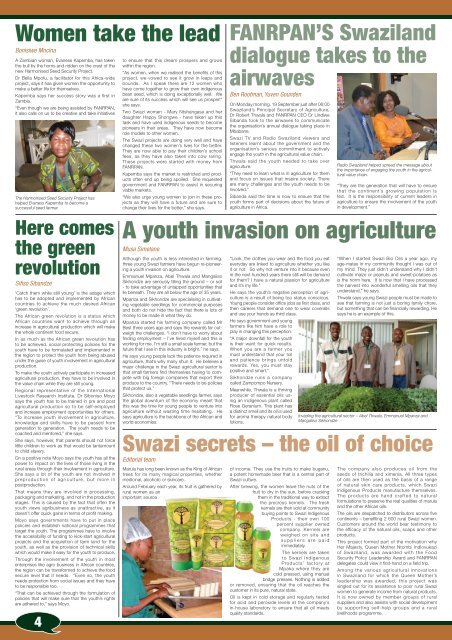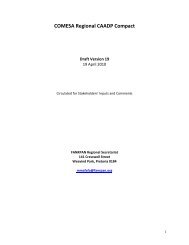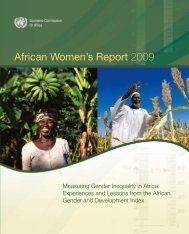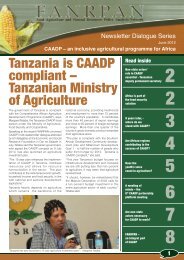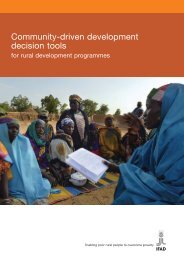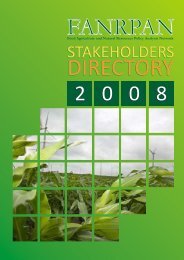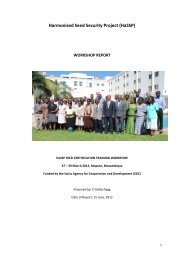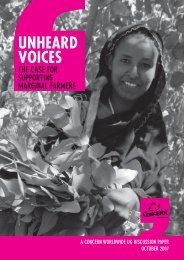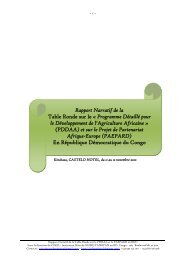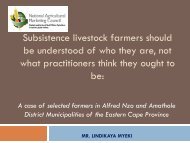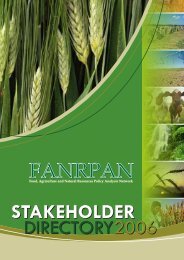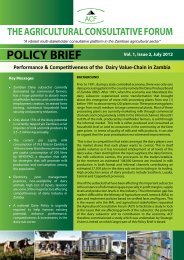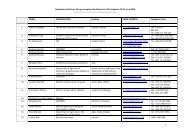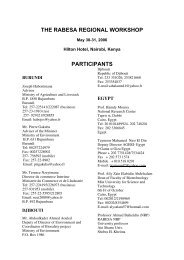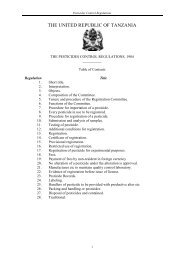1.5Mb ~ 4 min - FANRPAN
1.5Mb ~ 4 min - FANRPAN
1.5Mb ~ 4 min - FANRPAN
- No tags were found...
Create successful ePaper yourself
Turn your PDF publications into a flip-book with our unique Google optimized e-Paper software.
Women take the lead <strong>FANRPAN</strong>’S SwazilandBonisiwe MncinaA Zambian woman, Evaness Kapemba, has takenthe bull by the horns and ridden on the crest of thenew Harmonised Seed Security Project.Dr Bella Mpofu, a facilitator for this Africa-wideproject, says it has given women the opportunity tomake a better life for themselves.Kapemba says her success story was a first inZambia.“Even though we are being assisted by <strong>FANRPAN</strong>,it also calls on us to be creative and take initiativesThe Harmonised Seed Security Project hashelped Evaness Kapemba to become asuccessful seed farmer.Here comesthe greenrevolutionSifiso Sibandze‘Catch them while still young’ is the adage whichhas to be adopted and implemented by Africancountries to achieve the much desired African‘green revolution’.The African green revolution is a status whichAfrican countries want to achieve through anincrease in agricultural production which will makethe whole continent food secure.In as much as the African green revolution hasto be achieved, social protecting policies for theyouth have to be formulated and implemented inthe region to protect the youth from being abusedunder the guise of youth involvement in agriculturalproduction.To make the youth actively participate in increasedagricultural production, they have to be involved inthe value chain while they are still young.Regional representative of the InternationalLivestock Research Institute, Dr Siboniso Moyosays the youth has to be trained in pre and postagricultural production so to be self-employedand increase employment opportunities for others.“To increase youth involvement in agriculture,knowledge and skills have to be passed fromgeneration to generation. The youth needs to becoached and mentored,” she says.She says, however, that parents should not forcelittle children to work as that would be tantamountto child slavery.On a positive note Moyo says the youth has all thepower to impact on the lives of those living in therural areas through their involvement in agriculture.She says a lot of the youth are not involved inpreproduction of agriculture, but more inpostproduction.That means they are involved in processing,packaging and marketing, and not in the productionstages. This is caused by the fact that often theyouth views agribusiness as unattractive, as itdoesn’t offer quick gains in terms of profit making.Moyo says governments have to put in placepolicies and establish national programmes thattarget the youth. The programmes have to involvethe accessibility of funding to kick-start agriculturalprojects and the acquisition of farm land for theyouth, as well as the provision of technical skillswhich would make it easy for the youth to produce.Through the involvement of the youth in mostenterprises like agro business in African countries,the region can be transformed to achieve the foodsecure level that it needs. “Even so, the youthneeds protection from social issues and they haveto be responsible too.“That can be achieved through the formulation ofpolicies that will make sure that the youth’s rightsare adhered to,” says Moyo.4to ensure that this dream prospers and growswithin the region.“As women, when we realised the benefits of thisproject, we vowed to see it grow in leaps andbounds. As I speak there are 12 women whohave come together to grow their own indigenousbean seed, which is doing exceptionally well. Weare sure of its success which will see us prosper!”she says.Two Swazi women - Mary Ntshangase and herdaughter Happy Shongwe - have taken up thistask and have used indigenous seeds to becomepioneers in their areas. They have now becomerole models to other women.The Swazi projects are doing very well and havechanged these two women’s lives for the better.They are now able to pay their children’s schoolfees, as they have also taken into cow raring.These projects were started with money from<strong>FANRPAN</strong>.Kapemba says the market is restricted and productsoften end up being spoiled. She requestedgovernment and <strong>FANRPAN</strong> to assist in securingviable markets.“We also urge young women to join in these projectsas they will have a future and are sure tochange their lives for the better,” she says.dialogue takes to theairwavesOn Monday morning, 19 September just after 06:00Swaziland’s Principal Secretary of Agriculture,Dr Robert Thwala and <strong>FANRPAN</strong> CEO Dr LindiweSibanda took to the airwaves to communicatethe organisation’s annual dialogue taking place inMbabane.Swazi TV and Radio Swaziland viewers andlisteners learnt about the government and theorganisation’s serious commitment to activelyengage the youth in the agricultural value chain.Thwala said the youth needed to take overagriculture.“They need to learn what is in agriculture for themand focus on issues that inspire society. Thereare many challenges and the youth needs to beinvolved.”Sibanda said the time is now to ensure that theyouth forms part of decisions about the future ofagriculture in Africa.“They are the generation that will have to ensurethat the continent’s growing population isfed. It is the responsibility of current leaders inagriculture to ensure the involvement of the youthin development.”A youth invasion on agricultureMusa SimelaneAlthough the youth is less interested in far<strong>min</strong>g,three young Swazi farmers have begun re-pioneeringa youth invasion on agriculture.Emmanuel Mpanza, Abel Thwala and MangalisoSikhondze are seriously tilling the ground – or soil- to take advantage of untapped opportunities thatlie beneath. They are all below the age of 35 years.Mpanza and Sikhondze are specialising in cultivatingvegetable seedlings for commercial purposesand both do not hide the fact that there is lots ofmoney to be made in what they do.Mpanza started his far<strong>min</strong>g company called MrBest three years ago and says the rewards far outweighthe challenges. “I don’t have to worry aboutfinding employment – I’ve hired myself and this isworking for me. I’m still a small scale farmer, but thefuture that I see in this industry is bright,” he says.He says young people lack the patience required inagriculture, that’s why many shun it. He believes amajor challenge in the Swazi agricultural sector isthat small farmers find themselves having to competewith big foreign companies that export theirproduce to the country. “There needs to be policiesthat protect us.”Sikhondze, also a vegetable seedlings farmer, saysthe global downturn of the economy meant thatthis was the time for young people to venture intoagriculture without wasting time hesitating. Hesays agriculture is the backbone of the African andworld economies.“Look, the clothes you wear and the food you eateveryday are linked to agriculture whether you likeit or not. So why not venture into it because evenin the next hundred years there still will be demandfor them? I have a natural passion for agricultureand it’s my life.”He says the youth’s negative perception of agricultureis a result of being too status conscious.Young people consider office jobs as first class, andthen careers that demand one to wear coverallsand use your hands as third class.He says government and youngfarmers like him have a role toplay in changing this perception.“A major downfall for the youthis their want for quick results.When you are a farmer youmust understand that your toiland patience brings untoldrewards. Yes, you must staypositive and smart.”Sikhondze runs a companycalled Zampompo Nursery.Meanwhile, Thwala is a thrivingproducer of essential oils usingan indigenous plant calledRose Geranium. This plant hasa distinct smell and its oil is usedfor aroma therapy natural bodylotions.“When I started Swazi Bio Oils a year ago, myage-mates in my community thought I was out ofmy <strong>min</strong>d. They just didn’t understand why I didn’tcultivate maize or peanuts and sweet-potatoes asis the norm here. It is now that I have processedthe harvest into wonderful smelling oils that theyunderstand,” he says.Thwala says young Swazi people must be made tosee that far<strong>min</strong>g is not just a boring family chore,but something that can be financially rewarding. Hesays he is an example of this.Swazi secrets – the oil of choiceEditorial teamMarula has long been known as the King of Africantrees for its many magical properties, whethermedicinal, alcoholic or skincare.Around February each year, its fruit is gathered byrural women as animportant sourceBen Rootman, Yuven Goundenof income. They use the fruits to make buganu,a potent homemade beer that is a central part ofSwazi culture.After brewing, the women leave the nuts of thefruit to dry in the sun, before crackingthem in the traditional way to extractthe precious kernels. The freshkernels are then sold at communitybuying points to Swazi IndigenousProducts - their own 100percent supplier ownedcompany. Kernels areweighed on site andsuppliers are paidimmediately.The kernels are takento Swazi IndigenousProducts’ factory atMpaka where they arecold pressed, using manualbridge presses. Nothing is addedor removed, ensuring that the oil reaches thecustomer in its pure, natural state.Oil is kept in cold storage and regularly testedfor acid and peroxide levels at the company’sin-house laboratory to ensure that all oil meetsquality standards.Radio Swaziland helped spread the message aboutthe importance of engaging the youth in the agriculturalvalue chain.Invading the agricultural sector – Abel Thwala, Emmanuel Mpanza andMangaliso SikhondzeThe company also produces oil from theseeds of trichilia and ximenia. All three typesof oils are then used as the basis of a rangeof natural skin care products, which SwaziIndigenous Products manufacture themselves.The products are hand crafted to naturalformulations to preserve the real qualities of marulaand the other African oils.The oils are despatched to distributors across fivecontinents – benefiting 2 600 rural Swazi women.Customers around the world bear testimony tothe efficacy of the natural oils, soaps and otherproducts.This project formed part of the motivation whyHer Majesty, Queen Mother Ntombi Indlovukaziof Swaziland, was awarded with the FoodSecurity Policy Leadership Award and <strong>FANRPAN</strong>delegates could view it first-hand on a field trip.Among the various agricultural innovationsin Swaziland for which the Queen Mother’sleadership was awarded, this project wassingled out for its assistance to poor rural Swaziwomen to generate income from natural products.It is now owned by member groups of ruralsuppliers and also assists with social developmentby supporting self-help groups and a rurallivelihoods programme.


